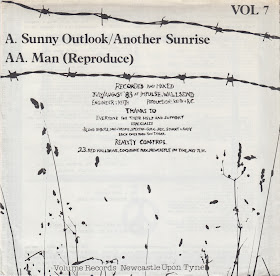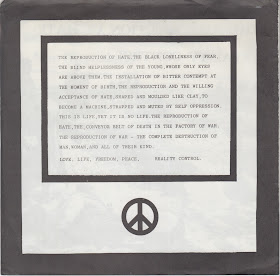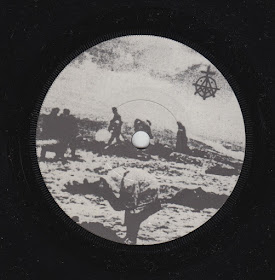The reproduction of hate, the black loneliness of fear, the blind helplessness of the young, whose only eyes are above them. The installation of bitter contempt at the moment of birth, the reproduction and the willing acceptance of hate, shaped and moulded like clay, to become a machine, strapped and muted by self-oppression. This is life, yet it is no life. The reproduction of hate, the conveyor belt of death in the factory of war. The reproduction of war - the complete destruction of man, woman, and all of their kind.
Not bad for a bunch of 16 year-olds. Not bad at all indeed. Of course, such a statement must be read and understood in the broader context of the British anarchopunk scene of the early 80's and, even more so, in the light of the harsh political climate that permeated the kingdom at that time, namely Thatcher's pointless war in the Falklands. But as much as a particular work reveals its essence when seen through the appropriate lens of time and place, I feel the words of Reality Control embodied perfectly the teenage angst, the outrage and this kind of empathetic anger that defined political punk worldwide in the 80's, like the Geordie version of a universally shared feeling.
In a sensible world, Reality Control would be hailed as "a classic anarcho band". If our minds were fueled with critical thinking, open-mindedness and a healthy spirit of enquiry, instead of a cheap thirst for validation and a lazy obedience to fads, you would probably be able to see RC shirts and patches at any given DIY punk festivals (and if there weren't any, you would know that you were at the wrong kind of punk festivals with the wrong kind of punx, which is always a useful information, although one that usually comes too late). Simply put, 1983's The reproduction of hate stands as one of the best anarchopunk Ep's of the early 80's and judging from the quality of the band's demo from the following year (the greatly-named While we live in cages), RC definitely had a strong, no, a classic album in them and I dare anyone to listen to "The highest bidder" or "Sugar and spice" and deny it (I'll censor your comments anyway, I can't lose). Perhaps the rather moderate popularity of the band has something to do with their location, geographically known as Newcastle-upon-Tyne but proverbially referred to as "up North" by Londoners. I will be honest. Before I got into punk, the only thing I knew about Newcastle was Alan Shearer. But since my life-changing conversion to Crass, Discharge and lectures about the evilness of meat-eating, it has become apparent that the area was - and still is - ripe with top punk bands. Although the decentralizing idea of "think globally, act locally" inherent to anarchopunk certainly spawned many young bands and people to become involved in their own towns (and RC undeniably were through the infamous Gateshead Music Collective and The Station which played a crucial role in shaping the scene there), England being such a centralized country, thus impacting not only the music production but also how it is perceived culturally, must have affected the whole punk dynamics of the time and the subsequent canonization of some at the expense of others (and coming from Paris, I can easily imagine how it works).
But then, fate also stroke. Blame the naivety of youthfulness or maybe just ignorance but the standard reaction to the cover of The reproduction of hate is always - with variations that have to do with levels of linguistic fluency - the following: "OMG but why did they pick the same cover as Amebix' No Sanctuary? I mean, lol, right?". Of course, No Sanctuary was actually released just a few months after The reproduction of hate, in November, 1983, but the image has become so closely associated with Amebix that, even knowing so, it is difficult to dissociate it from this legendary band, without mentioning the fact that No Sanctuary was a Spiderleg record which meant that it was more widely available. Even I cannot help but think about Amebix when looking at RC's Ep. Talk about ingrained images.
Like most of my generation (I presume), I first came across RC through the 2006 compilation cd Anti-Society which opened with "Forgive us", a song lifted from the band's first demo The happy face, recorded in early '83. Of course, I loved it and the introductory shouts to the song, "Money! Pay! Sin! Preach! Lies! War! Suck! Leech!", were all instant winners. This number is a catchy and tuneful one, a bit like a sloppy-but-passionate blend of Omega Tribe, Zounds and Chron Gen, but the rest of the demo also demonstrated that the band could pen moodier, darker songs as well as more dissonant and layered postpunk ones (like the ominous "But has it won?"). Although The happy face was thinly produced and not deprived of artistic flaws (to put it nicely), it certainly showed that the boys were quite ambitious in terms of songwriting. The reproduction of hate Ep would confirm this in the best way possible.
Thanks to a more focused sound and a raw but adequate production, it managed to capture the different moods and emotions of the music perfectly. Recorded in July, 1983, and released soon after on Volume Records (a local label that belonged to a record store of the same name that also put out Toy Dolls and Total Chaos records), it included three glorious songs, "Sunny outlook", "Another sunrise" and "Man (reproduce)". The first two, both on side A, should probably be seen as the two faces of a same story since they deal with the same topic - the Falklands war - but from different angles and they adopt darker, more melancholy sounds and textures. "Sunny outlook" is told from the perspective of the war propaganda during the conflict and how people are made to be proud of the national heroes and of the derelict British Empire, while "Another sunrise" is the band's reaction toward and criticism of the war, its hypocritical atrocities and the warlike mentalities. Pretty smart move lyrically and the songs echo with each other very well too, both mournful and angry mid-paced dark punk numbers that remind Omega Tribe's moodier moments, Demob, The Mob and Zounds. On the flipside, the song "Man (reproduce)" is a different kind of animal though, much punchier and punkier in an Anthrax-meets-Alternative way and it might be my favourite of the Ep. After an eerie intro, the song bursts into an energetic punk-rock anthem with the catchiest riff and fantastic vocals that sound urgent and slightly insane, especially with the breathless voice of the singer, as if he were overwhelmed by the subject - it being the endless reproduction of injustice and oppression - and could barely contain his outrage. Brilliant example of the relation between form and content here. After this upbeat part, the song then evolves into fast and snotty punk-rock graced with gratuitous shouts (and I bloody love those) before ending with the initial eeriness of the intro. A genuine anarchopunk hit that even the tunelessness of the bass cannot damage. The band's aspiration to write articulate punk songs able to convey several emotions can be seen in the way the two guitars complete each other, again not unlike in Omega Tribe's work, so that the songs always remain rhythmical and tuneful at the same time, and to achieve that RC certainly compensated a relative lack of musical proficiency with seriously though-out songwriting. And how punk is that?
Following this piece of magic, RC recorded the aforementioned While we live in cages demo in early '84, which saw them in an even darker and progressive mood, not unlike All the Madmen's bands like Flowers in the Dustbin or Null And Void for instance or even Alternative or The Lost Cherrees. The band then released a split flexi with their local partners in crime Blood Robots (a band that shared a lot of similarities with RC and that I rate at least as high) which included the song "Tears of blood", which for all its melancholy, its intensity and its beautiful tunes might be their crowning glory.
But in 2017, the best thing about Reality Control is that you can get their discography on vinyl and cd easily and for cheap thanks to Antisociety and Flat Earth Records. This is top-shelf, intelligent, and catchy anarchopunk. You know what you should do.


















